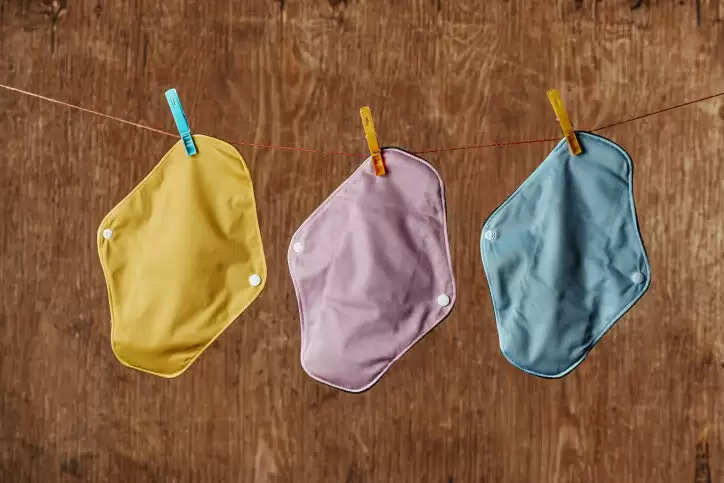Menstrual Cups To Period underwear: Here’s How To Practise Sustainable Menstruation
Sustainable menstruation refers to the practice of utilising eco-friendly and responsible biodegradable products during menstrual periods.

Menstruation, also known as the monthly period, is a natural biological process that occurs in millions of women each month. On average, women menstruate for about 40 years, during which they often rely on various products such as sanitary pads, tampons, menstrual cups, menstrual discs, and period underwear. Unfortunately, these products contribute to a significant amount of menstrual waste, as they are not biodegradable. As a result, this waste leads to environmental pollution. Therefore, it is essential to consider transitioning to sustainable menstruation as a solution.
It involves using alternative products throughout the menstrual cycle to promote women's health and protect the environment.
Sustainable practices for menstruation
Adopting sustainable practices during menstruation involves making conscious choices about menstrual products and waste management. Switching to reusable cotton pads, menstrual cups, and compostable pads made from agricultural waste can contribute to a more sustainable approach. These products are designed to be reused or biodegraded within a relatively short period of time (90-180 days) when disposed of correctly.
Sustainable period products
Achieving a more eco-friendly period doesn't mean you have to completely abandon pads and tampons. Instead, consider a mix-and-match approach to menstrual products that suits your individual needs. When it comes to sustainable menstrual products, you have a range of options to consider. However, before making a decision, it's important to conduct thorough research to determine which option aligns best with your needs and enables you to actively contribute to reducing period waste.
Here are several options for sustainable menstruation products:
Menstrual Cups: Crafted from silicone, these cups offer a safe and long-lasting solution, typically lasting 10 to 12 years. They are also incredibly user-friendly: simply empty, rinse, and reinsert the cup.
Reusable Pads: These pads are thin, flexible, and surpass the absorbency of regular disposable pads. They can be utilised for 3-5 years, making them a sustainable choice. Similar to menstrual cups, they are easy to use: empty, rinse, and dry.
Period Underwear: These affordable undergarments possess excellent absorption capabilities and can be washed and reused. They offer an environmentally friendly alternative to traditional disposable products
Opt for organic products
By opting for local organic products, you can ensure that you're using items that are free from pesticides and chemicals. These products are not only biodegradable but also provide a safer and gentler experience for your body.
Choose eco-friendly alternatives
The excessive reliance on plastic poses significant challenges across various industries. Whether it's integrated within the product itself or used for packaging, plastic remains a major concern. It is crucial to choose natural or eco-friendly alternatives that can effectively diminish your personal carbon footprint. Moreover, it is advisable to avoid products that are individually encased in plastic wrappers.
Do not flush
Refrain from flushing sanitary products down the toilet at all times. Most restrooms provide waste bins specifically designed for the disposal of menstrual products.
Segregation of menstrual waste
Failing to segregate menstrual waste from household waste can result in unsanitary working conditions for waste workers and increase the risk of infectious diseases among them. It is essential to securely wrap sanitary waste in pouches provided by the manufacturer or brand owners and hand it over separately to the waste collector, in order to prevent manual handling of such waste.
Spread the Message
After establishing a sustainable system, it is important to share your knowledge with your friends and family. By doing so, you can contribute not only to the protection of the environment but also to breaking the taboo surrounding menstruation in our society.
Conclusion
The path towards sustainable menstruation is a nuanced and evolving process. It requires time and adaptation. However, embarking on this journey is a remarkable and empowering experience in its own right. Sustainable menstruation has transformed the way society views sanitary waste, raising awareness about this pressing environmental issue. Women have taken the initiative to create positive change by altering this crucial monthly routine.
Using sustainable products offers the added benefit of significantly reducing monthly financial expenses for women. Hence, sustainable menstruation is both environmentally friendly and beneficial for women's health, while also being budget-friendly. Each woman's small contribution can make a substantial impact in revolutionising menstrual waste management and achieving sustainable menstruation.
Disclaimer: The above content is for informational purposes only and should not be used as a substitute for the advice of a qualified physician or doctor. The Company does not vouch for or endorse any of the above content, and disclaims any and all warranties, express or implied, relating to the same..png)